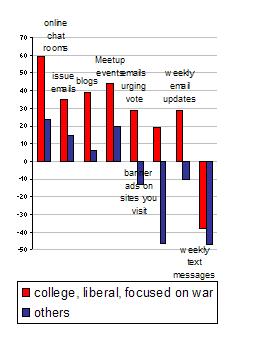We released a survey today that contains a lot of data about young people–their
civic and political behavior and attitudes, and specifically their reaction to
the ways political campaigns are using the Internet.
Campaigns are effectively using the Internet to reach young people, and will
continue to do so .
.
But is this because young people are computer-savvy and demand Internet based
campaigns? Or is it because campaigns see advantages to a cheap medium that
can reach and expand their base (more cost-effectively than broadcasts and
mass mailings)? Overall, our data show that young people are not particularly
favorable toward new, online campaigns techniques. They favor some approaches
but oppose others.
Despite a general lack of enthusiasm for many online campaign techniques,
however, there are some pools of young voters who do like the new technologies.
For example, those college students and college graduates who are liberal
and concerned about the War in Iraq are overwhelmingly aware of blogs and
favor their use in campaigns by 68%-32%. This group also likes “banner ads”and
weekly email updates, which are unpopular among youth in general.
The graph shows the percentage who like each campaign technique, minus those who don’t like it or call it a “turn-off.” We distinguish liberal college students who are concerned about the war (red bars) from other youth (blue).
These findings put the Dean phenomenon in context. The demographic group
that most likes his campaign themes is also most favorable toward electronic campaigning.
It is not at all clear that blogs and Meetup events would work nearly as well
for other candidates. Given that strong partisans and well-educated youth are most enthusiastic about the new technologies in politics, the Internet looks like a means to organize core voters, not a way to expand the franchise
 .
.